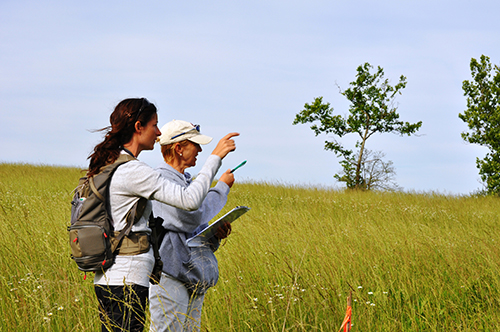Importance of Private Land Conservation and the work of Amy Johnson
By: Emily Nason
Posted on:01/16/2018 Updated:01/18/2018Engaging with private landowners is more important than ever when it comes to conservation. 71% of land in the lower 48 states is in private ownership.

Engaging with private landowners is more important than ever when it comes to conservation. 71% of land in the lower 48 states is in private ownership, so it’s vital for landowners to understand their land and how to protect it. Successful land conservation requires action and initiative at all levels. State agencies, local communities, and private individuals need the right tools to protect working farms and forests, scenic landscapes, natural areas, wildlife habitat and game lands, historic resources, and parks and recreational areas for present and future generations.
Enter Amy Johnson and the Virginia Working Landscapes!
“Though public lands are crucial for conserving some of our nation's last wild spaces, the reality is that private lands surround and connect these spaces. If we can provide private landowners with the knowledge, tools and motivation to manage their land in a way that promotes biodiversity and optimizes ecosystem services, we will be leaving a healthier planet for future generations”
Amy Johnson is the program director for Virginia Working Landscapes (VWL), a Smithsonian-led research initiative that encourages the conservation of native biodiversity and sustainable land-use through research, education and community engagement. So how is this accomplished?
RESEARCH: The team of scientists at VWL leads on-the-ground habitat monitoring to reveal how land use practices impact wildlife and how biodiversity benefits working landscapes.
ENGAGEMENT: VWL works closely with the community through citizen science, education and engagement. They partner with citizen scientists and landowners to conduct biodiversity surveys on private and public lands and create an information sharing network to promote best practices for conservation.
EDUCATION: VWL and the Smithsonian Conservation Biology Institute (SCBI) lead public lectures, seminars, workshops and courses that focus on a wide range of conservation topics. With the Smithsonian-Mason School of Conservation, they support a strong intern and graduate fellow programs as well.
As the program director, Johnson develops a network of private landowners, citizen scientists, NGO’s, state agencies and research scientists to collectively research the impacts of conservation management and land use on biodiversity.
As a former Smithsonian-Mason Research Fellow, Johnson’s Ph.D. research focused on the impacts of conservation and land management on breeding and over-wintering bird communities in Virginia. Specifically, her research is raising awareness on the importance of bobwhite quail conservation initiatives for conserving habitats for a group of steeply declining species. Through this research she discovered just how necessary private land conservation is.
“I was drawn to this kind of work (private lands conservation) during my masters when I spent a week in North Carolina helping the USFWS red wolf biologists with locating spring dens. I expected to spend much of this week in the field, following tracks and signals from radio collared wolves, so was surprised at how much time we spent engaging with private landowners. I realized that without this important component of the project, conservation of this species would have never been possible. By the end of the week, I was exploring opportunities to volunteer with organizations that emphasized conservation on private lands as I knew that this is where I wanted to focus my efforts. “
Johnson also used citizen science data to develop an occupancy model for loggerhead shrikes in the southeastern United States. Results of this research are now being used to facilitate state-level population monitoring through citizen-science initiatives. Prior to being awarded the Smithsonian-Mason Ph.D. Fellowship in Conservation Science, Johnson received her bachelor of science in agriculture from the University of Guelph in Ontario, Canada, and a master’s degree from George Mason University, focusing her research on developing assisted reproductive techniques in wolves.
 Sign In
Sign In
 Sign In
Sign In
